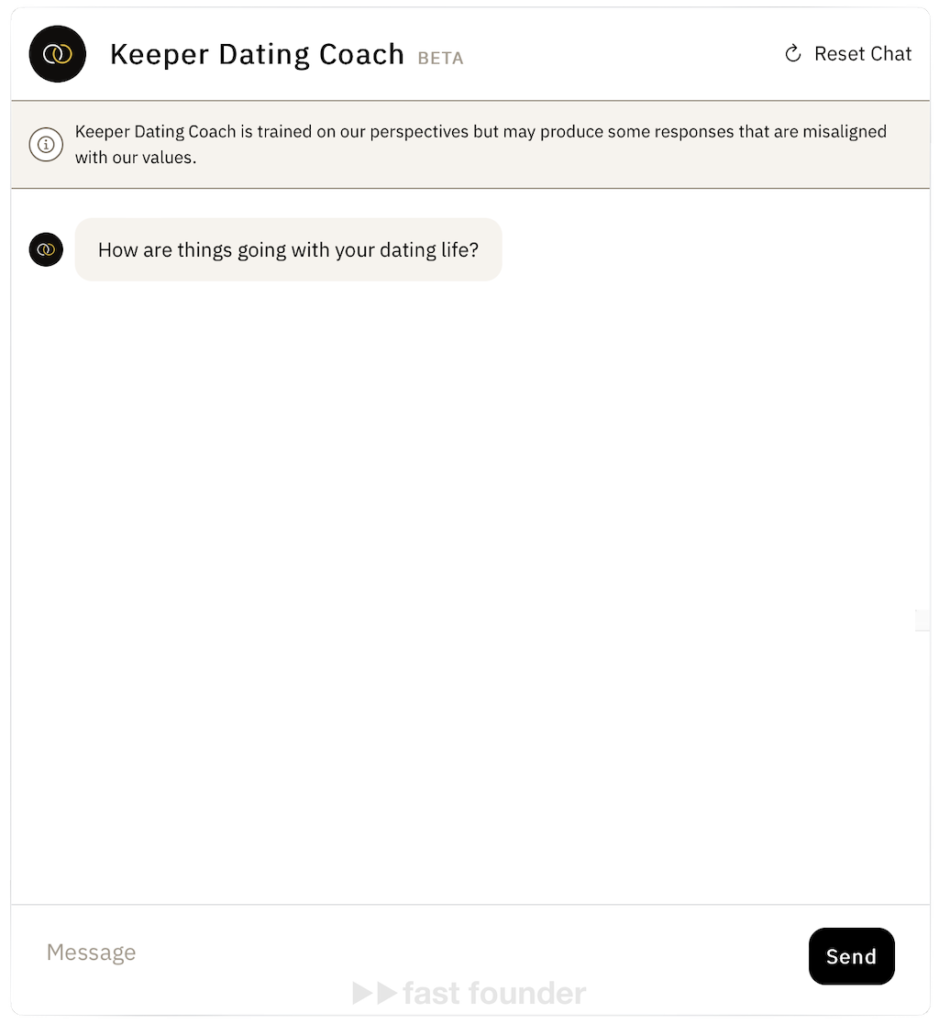What will never disappear is the desire of people to meet each other, be it for sex, relationships, or just shared interests. The need for dating services is growing because being online is making us more and more lonely 🙁 Strangely enough, AI has the potential to take dating services to a new level. And this can be taken advantage of right now, for instance, by following the model of this particular startup.
The essence of the project

Keeper is a service that helps find love… but not at first sight, but from the first acquaintance.

However, Keeper is not a typical dating app like Tinder. The goal of the startup is to help people fall in love, get married, and start a family, not just find partners for one-night stands.

Therefore, everything starts with the new user having to tell Keeper about all their desires and preferences in choosing a partner. After that, the startup promises to introduce the user to other service users who meet all these criteria.

Purely visual and physical parameters such as age, height, weight, eye, and hair color, and the like are not enough for this. Keeper asks people deep questions, with which you can describe the psychotype of the respondent and the person they want to meet.

As a result, the answers to the questionnaire are not just a choice of one of the options – they are detailed descriptions, in which any words and formulations can be used. But how now to match the stream of consciousness of one user with the streams of consciousness of other users to find a match between them and suggest these people meet each other?
For this, a special AI machine is used, which can analyze and match arbitrary descriptions of appearance, character, habits, and other human qualities with each other. It can even match a textual description of the desired partner’s appearance with photos from user profiles to find potential partners with the desired appearance.

Another application of AI that the startup is currently testing is an AI coach that trains service users in the skill of getting acquainted with each other.
The problem is that you might be a good and suitable person – but deep inside 😉 On the surface – you are either shy and stutter, or try to compensate for shyness with excessive bravado, or are not accustomed to talking about feelings, or have not learned to recognize the emotions of interlocutors, and so on. And when two such people who can’t communicate in a human way meet each other – the acquaintance usually ends with nothing, even if they are well suited to each other.

Nonetheless, the startup claims that 20% of the initial introductions made by Keeper lead to long-term relationships. This may not always lead to marriage, but it results in something more lasting than a fleeting encounter.

The service began operating earlier this year. By the end of summer, it had reached 20,000 organic traffic users per month, and in October, this number skyrocketed to 100,000. Concurrently, the number of weddings among the service’s users steadily increased from the start of summer.

The founder of Keeper stated on Twitter that the number of paid users of the service is growing by 65% per month. These results seemed promising to investors, leading to Keeper raising its first $987,000 in investments.
What’s interesting
to note is that the startup has departed from the subscription model commonly used by most dating services. Keeper believes that this model is not suitable for a dating service aimed at establishing serious relationships, as it may align the service’s interests against those of the users — the longer a user stays single, the more they pay for the subscription and new dating options.

Instead, Keeper has adopted a pay-for-results model. One option includes a payment for marriages resulting from matches made on the service. This model incentivizes the service to quickly find the most compatible matches to expedite marriages and, consequently, payments.
The exact amount users pay for a wedding is unclear, but it appears to be significant. In June, Keeper made $500,000 from this model, and by October, the revenue had grown to over $3.5 million. However, wedding payments are not the only monetization model.

Another option is a payment for a first introduction to a person who meets all the user’s criteria. In this case, the service suggests a match that both participants must approve online before meeting in real life.
As a result, paid users have the opportunity to meet both paid and free users, significantly increasing their chances of a successful match. This model keeps the interests of the users and the service aligned.

The founder attributes the potential success of such a service to the advancements in AI technology. The founder reasonably suggests that products now have the opportunity to thrive because they:
- Exist in a mass market.
- Have an inherent network effect that could lead to a monopoly.
- Utilize AI to solve problems that were difficult to address before the advent of AI.
In this context, the founder asserts that finding a partner for family creation is precisely one of these problems.

The U.S. Surgeon General’s office in 2023 published a report titled “The Epidemic of Loneliness and Isolation,” characterizing the situation in the country as such.

This report was previously mentioned in my writing about the startup Meeno, which develops an AI coach for human relationships and managed to raise $5 million even before launching its app, scheduled for January next year. This underscores the increasing severity of the loneliness problem.
On one hand, the desire to create a family is a natural human need. On the other, people have become so distant from each other that finding a partner has become increasingly challenging. This difficulty arises not because people have become pickier but because their options are diminishing as work and social interactions increasingly move online, leading to fewer and more superficial real-life encounters.
This situation necessitates tools that can facilitate finding the most suitable online dating options, a task that is impossible without thoroughly matching millions of people’s external physical and internal psychological profiles.
Manual profiling is a long and arduous task, but AI can significantly speed up and simplify this process. The founder of Keeper mentions that, despite using AI, profile matching in the service still requires considerable human effort. However, there’s a prospect of reducing these efforts as AI technology advances and as experience in matching accumulates, which can gradually be transferred to AI.
Where to run
The general direction is toward entering the market of services combating loneliness, a natural trend that comes as a flip side to the trend of people’s lives moving online. We might seem to communicate more in messengers and social networks, but it’s not the same as real interactions.
Thus, the problem is becoming increasingly relevant, meaning it’s a good time to address it, as it will not only persist but also grow in the foreseeable future.
AI technologies are almost the only way to find people online with whom one might want to communicate often and sincerely, both in real life and online.
However, dating services aimed at creating families are somewhat “one-time” solutions, as most people choose a partner for a long-term commitment. A desire for regularity and high LTV (Lifetime Value) arises.
This suggests that the same technology could be used for forming connections based on mutual interests in various areas, potentially a more “long-playing” theme.
Thus, the first practical move is to replicate the technologies and goals of Keeper. The second is to use the same technology for more general purposes of forming connections for various reasons.
Additionally, the combination of paid and free models in Keeper’s business strategy is intriguing. This raises the question of what other services could utilize a similar approach to increase reach through free options while avoiding a complete lack of monetization.
About the company:
Keeper Website: keeper.ai
Last funding round: $987K, 12.11.2023
Total investment: $987K, rounds: 1
